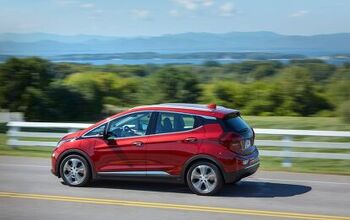Ford Trimming 12,000 European Jobs Before 2021

Back in January, Ford provided the preliminary details for its European restructuring plan. The company had been losing money there for years and didn’t want it to be remain a liability as it dumped cash into autonomous research and electric vehicle development. With aims to achieve a 6-percent operating margin within the region, the automaker’s plan to tidy up the business was put into motion.
Thus far, Ford has ceased production at three plants in Russia, cut shifts in Germany and Span (rest in peace, C-Max), and has earmarked additional facilities in France and the United Kingdom for closure. By the end of next year, the automaker expects to have cut 12,000 jobs related to its European operations.
That figure comes via Reuters, which discussed the restructuring plan with Ford’s European head Stuart Rowley. “We have largely concluded consultations with social partners regarding restructuring actions,” he said.
From Reuters:
About 12,000 jobs will be affected at Ford’s wholly owned facilities and consolidated joint ventures in Europe by the end of 2020, primarily through voluntary separation programs.
Around 2,000 of those are fixed salaried positions, which are included among the 7,000 salaried positions Ford is reducing globally, the carmaker said. The rest are workers on hourly contracts or agency workers.
Ford currently has 51,000 employees in Europe (65,000 when you count joint ventures) and 24 facilities. But it’ll be shy 12,000 people and drop at least 6 factories by the time the ball drops on December 31st, 2020.
Based on statistics from the European Automobile Manufacturers’ Association (ACEA), Euro car sales fell by 4.6 percent in January vs the same month in 2018. At the time, ACEA claimed this was not the dire situation it seemed to and expected a stable year. But its tune has changed. On Thursday, the group suggested that European passenger car registrations would slip by 1 percent in 2019, nullifying its previous prophecy of modest growth.
The extended forecast for Europe looks equally grim. Most analysts now assume the region will continue to backslide in terms of growth, with the more optimistic scenario being stabilization. However, even a stagnating auto market is predicated on the belief that Europe’s economy will balance itself out when there’s a fair bit of evidence pointing toward a continental recession and continued trade woes. Still, let’s not count any chickens before they’ve hatched.
While the next few years are expected to be difficult for every manufacturer operating within Europe, Ford believes its plan to streamline its commercial vehicle business with help from Volkswagen and the restructured Ford Sollers joint venture will work. It’s also abandoning passenger “vans” (M-segment vehicles) to focus more on developing electrified crossovers — which it expects to be more profitable in the long run. Understandable, as Europe’s M-segment has been faltering for years and crossovers are more fashionable.
However, all of this means less product being built within Europe’s borders. As a result, Ford said it expects to triple passenger car imports into the market by 2024.
[Image: Ford Motor Co.]

A staunch consumer advocate tracking industry trends and regulation. Before joining TTAC, Matt spent a decade working for marketing and research firms based in NYC. Clients included several of the world’s largest automakers, global tire brands, and aftermarket part suppliers. Dissatisfied with the corporate world and resentful of having to wear suits everyday, he pivoted to writing about cars. Since then, that man has become an ardent supporter of the right-to-repair movement, been interviewed on the auto industry by national radio broadcasts, driven more rental cars than anyone ever should, participated in amateur rallying events, and received the requisite minimum training as sanctioned by the SCCA. Handy with a wrench, Matt grew up surrounded by Detroit auto workers and managed to get a pizza delivery job before he was legally eligible. He later found himself driving box trucks through Manhattan, guaranteeing future sympathy for actual truckers. He continues to conduct research pertaining to the automotive sector as an independent contractor and has since moved back to his native Michigan, closer to where the cars are born. A contrarian, Matt claims to prefer understeer — stating that front and all-wheel drive vehicles cater best to his driving style.
More by Matt Posky
Latest Car Reviews
Read moreLatest Product Reviews
Read moreRecent Comments
- MaintenanceCosts Poorly packaged, oddly proportioned small CUV with an unrefined hybrid powertrain and a luxury-market price? Who wouldn't want it?
- MaintenanceCosts Who knows whether it rides or handles acceptably or whether it chews up a set of tires in 5000 miles, but we definitely know it has a "mature stance."Sounds like JUST the kind of previous owner you'd want…
- 28-Cars-Later Nissan will be very fortunate to not be in the Japanese equivalent of Chapter 11 reorganization over the next 36 months, "getting rolling" is a luxury (also, I see what you did there).
- MaintenanceCosts RAM! RAM! RAM! ...... the child in the crosswalk that you can't see over the hood of this factory-lifted beast.
- 3-On-The-Tree Yes all the Older Land Cruiser’s and samurai’s have gone up here as well. I’ve taken both vehicle ps on some pretty rough roads exploring old mine shafts etc. I bought mine right before I deployed back in 08 and got it for $4000 and also bought another that is non running for parts, got a complete engine, drive train. The mice love it unfortunately.


































Comments
Join the conversation
Before long GM will be a wholly owned Chinese company with Barra and the GM board taking their golden parachutes.
Laid off Ford Proud